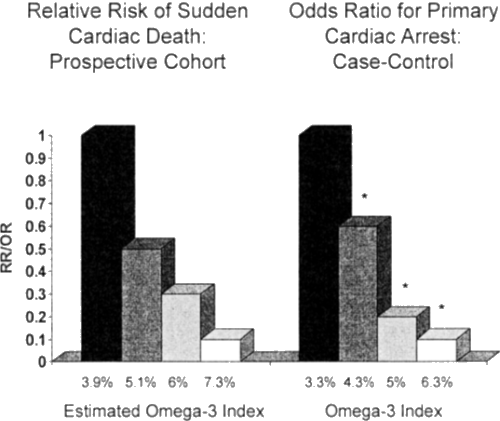The omega-3 index: Shedding new light on cardiac
risk
 So you take a few
fish oil capsules every day. You try to eat fish once or twice a week.
But is that enough to take full advantage of the heart health benefits
of omega-3 fatty acids? Is it enough to maximally reduce risk for heart
attack and other cardiovascular events?
So you take a few
fish oil capsules every day. You try to eat fish once or twice a week.
But is that enough to take full advantage of the heart health benefits
of omega-3 fatty acids? Is it enough to maximally reduce risk for heart
attack and other cardiovascular events?
If you take fish oil capsules, what is the concentration of omega-3
fatty acids? How well are they absorbed? How effectively are the omega-3
fatty acids you absorb incorporated into cell membranes?
Even if you take fish oil capsules, can you be sure that the amount of
omega-3 fatty acids in your blood and tissues is at an optimum level?
It is now possible to measure the amount of omega-3 fatty acids in your
bloodstream and confidently know just how much you have. Too little and
you might still be at high risk for cardiovascular events.
Omega-3 levels and sudden cardiac death
Two large studies, one from the University of
Washington study and the other from Boston, demonstrated that higher
omega-3 blood (the level in red blood cells, or RBCs) levels were
associated with reduced likelihood of sudden cardiac death:

Harris WS 2008; adapted from Siscovick DS et al 1995 and Albert CM et al
2002
The omega-3 Index was derived from whole blood omega-3 levels,
which
correlate with RBC omega-3 levels, and are thus “estimated.”
From the graph, you can see that the risk for sudden cardiac death is
10-fold higher for the lowest omega-3 RBC levels compared to the
highest.
What’s the average omega-3 RBC level for Americans? Most Americans have
omega-3 RBC levels in the 2.5-4.0% range. People with heart disease can
have levels less than 1%.
Subsequent studies have shown that the proportion of omega-3 fatty
acids, or the omega-3 index, has greater power to discriminate who will
have a heart attack or die from sudden cardiac death better than any
other common laboratory measure of coronary risk, including LDL
cholesterol, HDL cholesterol, triglycerides, total cholesterol to HDL
ratio, homocysteine, and c-reactive protein.
Beyond the heart attack- and sudden cardiac death-reducing effects
demonstrated in studies like the 11,000-participant GISSI Prevenzione
Study, omega-3 fatty acids modify the properties of cell membranes,
including those in heart muscle. Omega-3 fatty acids stabilize heart
rhythm generation, thus the decreased abnormal heart rhythms observed in
both experimental preparations and humans. When omega-6s are released
from cell membranes by the action of the enzyme, phospholipase A2,
inflammatory eicosanoids like thromboxane are released. When omega-3s
are released instead, a cascade of anti-inflammatory eicosanoids like
prostacyclin are produced, along with beneficial action on nuclear
receptors that yield improved lipid metabolism. This results in reduced
triglycerides, reduced blood pressure, improved endothelial
responsiveness, and more stable plaque.
What does the omega-3 index tell you? Just as hemoglobin A1c offers a
3-month look into blood glucose levels, the omega-3 index reflects your
long-term omega-3 intake. The quantity of RBC omega-3s also closely
parallels the quantity of omega-3s in heart tissues.
What is an ideal omega-3 index?
The above curves relating RBC omega-3 levels and sudden cardiac death
suggest that a level of 6.3-7.3% is associated with far fewer fatal
events - but events are not eliminated at this level. Is there even
greater benefit with levels higher than 6.3-7.3%?
A recent analysis of females from the Harvard School of Public Health
suggested that RBC omega-3 levels as high as 8.99% were still associated
with non-fatal heart attack (myocardial infarction), compared to 9.36%
in those without heart attacks. This suggests that even higher levels
are necessary to prevent non-fatal events (Sun 2008).
What’s your omega-3 index?
The appreciation of the importance of omega-3 fatty acids marks one
of the greatest health revelations of the last 50 years. We can now
quantify it.
The ability to measure the proportion of omega-3 fatty acids in red
blood cells may provide yet another means for all of us to further
reduce plaque growth and risk for cardiovascular events.
Should you choose to have your RBC omega-3 index measured, please be
sure to report your experience back to us through
The Heart Scan Blog or through the Forums on
www.trackyourplaque.com.
Copyright 2009 Track Your Plaque, LLC